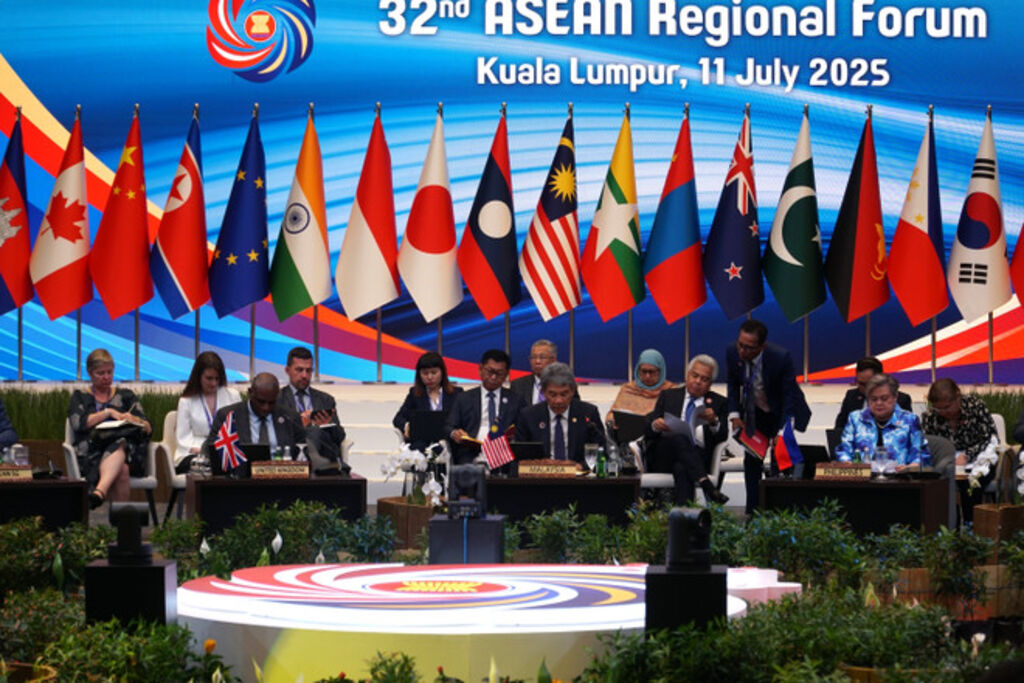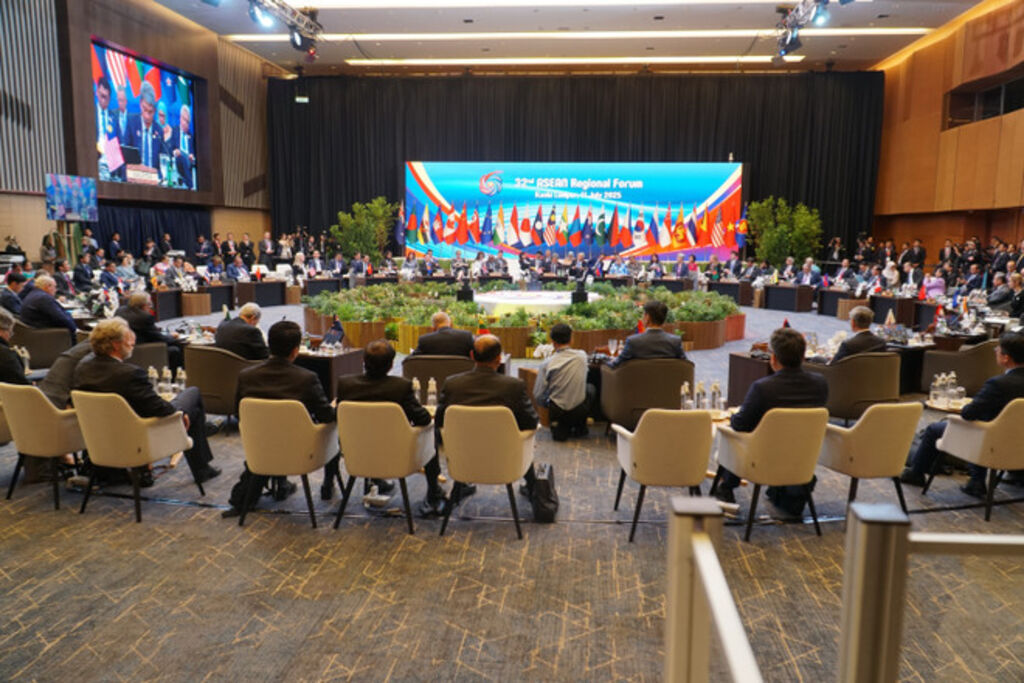 |
| At the 32nd ASEAN Regional Forum in Kuala Lumpur__Photo: VNA |
As regional tensions escalate and strategic uncertainties mount across Asia-Pacific, Vietnamese Deputy Prime Minister and Minister of Foreign Affairs Bui Thanh Son has called on the ASEAN Regional Forum (ARF) to promote reforms to maintain its role and respond proactively and flexibly to evolving challenges.
At the 32nd ARF in Kuala Lumpur on July 11, which brought together 27 member states, Son affirmed the forum’s significance over the past three decades as a key dialogue platform for promoting trust-building, and cooperation, contributing to peace and security in the region.
Peace and security, he said, are not inherently guaranteed but must be maintained through shared efforts, dialogues, cooperation, trust, and compliance with international law.
Discussing international and regional issues, Deputy PM and FM Son reaffirmed ASEAN's stances on the East Sea, Myanmar, the Middle East, and the Korean Peninsula. On the East Sea issue, Vietnam maintains its steadfast position of peacefully resolving disputes based on international law, particularly 1982 United Nations Convention on the Law of the Sea (UNCLOS) – the comprehensive legal framework governing maritime activities. He requested partners to support ASEAN's principled stance and efforts in maintaining peace and stability in the waters.
He laid stress on the need to fully and effectively implement the Declaration on the Conduct of Parties in the waters (DOC) and advancing substantive and effective negotiations towards a Code of Conduct (COC) in accordance with international law, including UNCLOS 1982.
At the event, ministers expressed their concerns over the far-reaching impacts of intensifying geopolitical competition and global instability, as well as emerging transnational security threats. Participants reaffirmed ARF’s critical role in promoting dialogue and preventive diplomacy, strengthening trust, and addressing political and security issues for the collective benefit of the region.
They acknowledged significant progress in implementing the Hanoi Action Plan for 2020-25, praising ARF members' efforts in executing various action streams. Ministers agreed to conduct an end-of-term review to extract valuable lessons and best practices, while consensus emerged that the post-2025 ARF Action Plan must establish specific objectives and feasible measures to ensure practical and effective cooperation.
The forum welcomed initiatives to revitalize and strengthen the ARF's dynamism, agreeing on the need to update the ARF Vision Statement to enhance the forum's effectiveness and flexibility in responding to issues of mutual concern, thereby contributing to the mitigation of threats to regional peace and security.
The ministers engaged in extensive discussions on both traditional and non-traditional security challenges, endorsing a catalog of nearly 30 ARF activities for 2025-26. These initiatives will advance cooperation across multiple sectors including maritime security, counter-terrorism, cybersecurity governance, violent extremism prevention, online fraud combat, and climate change response. Vietnam will continue co-chairing the ARF Inter-sessional Group on disaster relief alongside Bangladesh and Sri Lanka in 2025-26.
Regarding international and regional issue, member states affirmed their support for ASEAN's principled stance and role, while emphasizing the rule of law and peaceful dialogue, resolving disputes through peaceful means consistent with international law.
The 32nd ARF served as the final activity, concluding the week-long 58th ASEAN Foreign Ministers' Meeting and Related Meetings (AMM-58). The positive outcomes achieved at these meetings continue to affirm ASEAN's spirit of solidarity, self-reliance, strategic autonomy, and centrality, opening opportunities to promote cooperation between the bloc and its partners while contributing positively and responsibly to peace, security, stability, and sustainable development in the region and the world. These conferences also represent important preparatory steps toward the 47th ASEAN Summit and related summits, scheduled to take place in Kuala Lumpur from October 26-28.
Earlier, in the framework of the AMM-58, ASEAN+1 Foreign Ministers' Meetings with the UK and European Union (EU) took place, along with the 15th East Asia Summit (EAS) Foreign Ministers' Meeting.
As the ASEAN-UK dialogue coordinator, Deputy PM and FM Son co-chaired the ASEAN-UK Foreign Ministers’ Meeting with UK Secretary of State for Foreign, Commonwealth and Development Affairs David Lammy. The UK reiterated its strong commitment to ASEAN and supporting the bloc to play a central role in maintaining regional peace and stability, expressing its desire to deepen cooperation with ASEAN to promote dynamic, innovative, and sustainable development, while effectively dealing with fluctuations amid the reshaping of the global strategic balance.
Speaking on behalf of ASEAN, Son highlighted the impressive development of the ASEAN-UK Dialogue Partnership since its establishment in 2021. ASEAN appreciated the UK's active participation across all three pillars of politics-security, economy, and socio-culture, with 94.48 percent of action lines under the 2022-26 Action Plan already implemented.
ASEAN welcomed the UK's formal observer status in the ASEAN Defense Ministers' Meeting Plus (ADMM+) Experts' Working Groups on Military Medicine and Maritime Security, recognizing the UK's positive contributions in advancing the women, peace and security agenda and its assistance in cybersecurity, transnational crime prevention, online fraud, human trafficking, and drug-related crimes.
The ministers underscored the need to cooperate for innovation, development of small and medium-sized enterprises, and promotion of inclusive digital economy. ASEAN valued the UK’s pledge of EUR 17 million (USD 19.88 million) in concessional green finance to the ASEAN Catalytic Green Finance Facility (ACGF) and an additional 40 million EUR to the ASEAN-UK Green Transition Fund.
On the socio-cultural front, the bloc welcomed the ASEAN-UK SAGE Women in STEM Scholarships, part of the ASEAN-UK Supporting the Advancement of Girls' Education (SAGE) program; and the new Chevening ASEAN Scholarship program. It also commended the UK’s active engagement with the ASEAN Coordinating Centre for Humanitarian Assistance on Disaster Management (AHA Centre) and its humanitarian aid to Myanmar following the earthquake on March 28, 2025, with an initial GBP 10 million (USD 13.5 million) in aid and a total assistance of up to GBP 25 million .
At the ASEAN Post-Ministerial Conference with the European Union (EU), High Representative for Foreign Affairs and Security Policy and Vice President of the European Commission Kaja Kallas said ASEAN and EU share values, interests, and common responsibilities for upholding a rules-based international order, multilateralism, and international law, particularly amid today’s complicated geopolitical and economic landscape. Both sides need to step up regional integration and deepen ties ahead of the 50th anniversary of bilateral relations in 2027, she said.
The two sides noted that over 60 percent of action lines under the ASEAN-EU Plan of Action for the 2023–27 period have already been deployed. The EU remains ASEAN’s third largest trading partner and the second largest investor, with trade volume nearing USD 293 billion and FDI inflows reaching USD 20 billion in 2024. Countries welcomed the effective implementation of the ASEAN-EU Trade and Investment Work Program, the ASEAN-EU Comprehensive Air Transport Agreement, and the EU's support for digital transformation, green economic growth, inclusive and sustainable development. They reaffirmed their commitment to advancing negotiations toward an ASEAN-EU Free Trade Agreement in the long term.
Ministers pledged stronger cooperation in climate action, education, gender equality, disaster management, and combating transnational crimes and cybercrime. ASEAN appreciated the 6-million-EUR ASEAN-EU-Germany Climate Action Program, aimed at enhancing ASEAN’s leadership in regional climate cooperation, renewable energy, and energy efficiency. ASEAN also welcomed the EU’s EUR 10 billion (USD 11.69 billion) commitment to regional infrastructure projects under the Global Gateway initiative.
 |
| The ARF member states underscore the rule of law and peaceful dialogue, resolving disputes through peaceful means consistent with international law__Photo: VNA |
At the 15th East Asia Summit (EAS) Foreign Ministers’ Meeting, delegates reaffirmed the EAS’s role in reinforcing multilateralism and a rules-based international order. They stressed the need to foster a favorable environment for peace, security, stability, and development; uphold dialogue and cooperation instead of confrontation, and build trust while respecting international law. Countries pledged to support ASEAN’s central role and assist with the building of the ASEAN Community. Ministers agreed to further enhance the EAS’s effectiveness amid rapidly shifting global and regional landscapes, particularly ahead of the EAS’s 20th founding anniversary.
The meeting noted progress under the EAS Plan of Action 2024–28, especially in priority areas like peace and security, sustainable development, energy, digital economy, connectivity, and cybersecurity.
On global and regional issues, they vowed to jointly fight transnational crimes and cybercrime and ensure cybersecurity. Their discussions also touched on ways to boost trade, reinforce a fair and rules-based multilateral trading system, and promote digital transformation, circular economy, green growth, and supply chain resilience. Efforts by ASEAN to negotiate a Digital Economy Framework Agreement (DEFA) and advance the ASEAN Power Grid were welcomed.
Participants also stressed the need to deepen collaboration across food security, sustainable tourism, human resource development, health care, mental health, and the empowerment of women, youth, and vulnerable groups in the development process.
In his speech, Deputy PM and Minister of Foreign Affairs Bui Thanh Son underscored the importance of boosting economic ties with partners, particularly in ASEAN’s priority areas under its 2045 Vision, especially green transition, digital transformation, inclusive and sustainable growth, supply chain consolidation, green infrastructure, and SME capacity building.
He stressed that it is time to review a proposal on the comprehensive ASEAN-EU Free Trade Agreement (FTA) on the back of existing bilateral agreements. He urged remaining EU members to soon ratify the EU-Vietnam Investment Protection Agreement (EVIPA), and welcomed initiatives on renewable energy infrastructure, smart grids, innovative finance, digital capacity building, cybersecurity, data governance, and artificial intelligence.
Son commended educational exchange programs, scholarships and highly-skilled workforce training from partners like the UK and the EU, encouraged connections between ASEAN research centers and expert networks with partners, and supported stronger medical cooperation and response to public health emergencies.
At the meetings, Vietnam also shared viewpoints on key global and regional issues such as the East Sea, Myanmar, and the Korean Peninsula. The country called for continued international support for ASEAN’s principled stance on the East Sea issue, the full and effective implementation of the Declaration on the Conduct of Parties (DOC), and the finalization of an effective and substantive Code of Conduct in the East Sea (COC) in line with international law, including the 1982 United Nations Convention on the Law of the Sea (UNCLOS), aiming to turn the East Sea into a sea of peace, cooperation, and sustainable development.- (VNA/VLLF)









